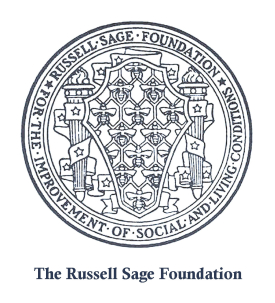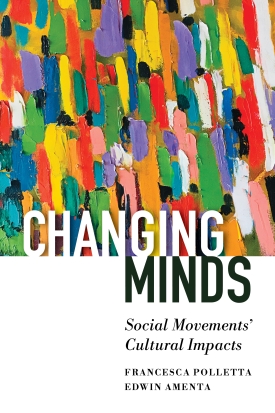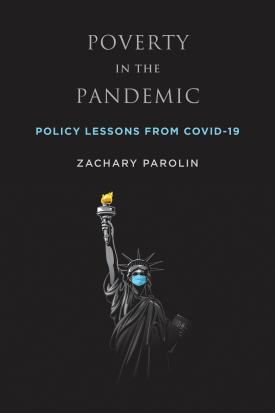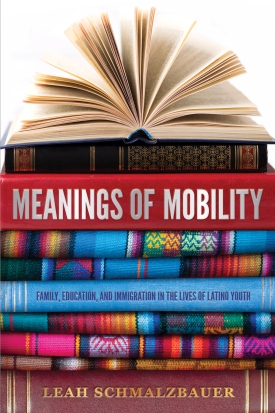
Charlie’s Reform: A Motion Picture Drama on the Schoolhouse Social Center
About This Book
This booklet discusses a film about the use of the schoolhouse as a social center and explains how to obtain the film and make it effective.
CLARENCE A. PERRY was an urban planner, sociologist, and educator.
RSF Journal
View Book Series
Sign Up For Our Mailing List
Apply For Funding

A Modern St. George: The Growth of Organized Charity in the United States
About This Book
This article from Scribner’s Magazine was reprinted with permission by the Russell Sage Foundation. It discusses the growth of charity organizations in the United States. A note from the foundation indicates that the original article was illustrated and contained a sketch of New York City social agencies and tributes to the founders of those organizations.
JACOB A. RISS (1849–1914) was a journalist and social reformer.
RSF Journal
View Book Series
Sign Up For Our Mailing List
Apply For Funding
A Modern St. George: The Growth of Organized Charity in the United States
About This Book
This article from Scribner’s Magazine was reprinted with permission by the Russell Sage Foundation. It discusses the growth of charity organizations in the United States. A note from the foundation indicates that the original article was illustrated and contained a sketch of New York City social agencies and tributes to the founders of those organizations.
JACOB A. RISS (1849–1914) was a journalist and social reformer.
Download
RSF Journal
View Book Series
Sign Up For Our Mailing List
Apply For Funding

Changing Minds
About This Book
Social movements—organized efforts by relatively powerless people to change society—can result in legal and policy changes, such as laws protecting same-sex marriage and tax rebates for solar energy. However, movements also change people’s beliefs, values, and everyday behavior. Such changes may help bring about new policies or take place in the absence of new policy, yet we still know little about when and why they occur. In Changing Minds, sociologists Francesca Polletta and Edwin Amenta ask why movements have sometimes had fast and far-reaching cultural influence.
Polletta and Amenta examine the trajectories of U.S. social movements, including the old-age pension movements of the 1930s and 1940s, the Black rights movement of the 1950s and 1960s, the women’s movement of the 1970s, right-wing movements in the 1980s and 1990s, and the environmental movement up to the present, to determine when, why, and how social movements change culture. They find that influential movements are featured in the news, but not only in the news. Movement perspectives may appear also in opinion and commentary outlets, on television talk shows and dramas, in movies, stand-up comedy, and viral memes. Popular culture producers remake movement messages as they transmit them, sometimes in ways that make those messages compelling. For example, while the news largely ignored feminists’ challenge to inequality in the home, popular cultural outlets turned “liberation” into a resonant demand for women’s right to self-fulfillment outside the home and within it. Widespread attention to the movement may lead people to change their minds individually. But more substantial change is likely when companies, schools, and other organizations outside government strive to get out in front of a newly legitimate issue, whether environmental sustainability or racial equity, by adopting movement-supportive norms and practices. Eventually, ideas associated with a movement may become a new common sense—though not always the ideas that the movement intended.
Throughout Changing Minds, Polletta and Amenta provide activists with strategies for getting their message heard and acted on. They suggest how movement actors can get into the news as political players or experts rather than lawbreakers or zealots. They show when it makes sense for activists to work with popular cultural producers and when they should create their own cultural outlets. They explain why the routes to cultural influence have changed and why urging people to take one easy step to save the planet can do more harm than good.
Changing Minds is a fascinating exploration of why and how some social movements have caused profound shifts in society.
FRANCESCA POLLETTA is Chancellor’s Professor of Sociology, University of California, Irvine
EDWIN AMENTA is Professor of Sociology, University of California, Irvine
RSF Journal
View Book Series
Sign Up For Our Mailing List
Apply For Funding
Having the ability to engage in political information seeking – the ability to find, access, and utilize political information – is paramount in allowing people to take part in and make informed political decisions. However, research has shown that experiencing socioeconomic hardship and poverty can lead to lower levels of political information seeking and knowledge.
The U.S. is undergoing a historic demographic shift as, collectively, Asian, Black, Latino, multiracial, and other people of color are projected to become the numerical majority. To date, most social science research has employed controlled experiments to study the response of non-Hispanic Whites to this projected change. This project will center people of color and take advantage of a natural experiment—the release of new census projections in 2023—to understand the effects of real-world exposure to racial projections on public opinion.

Stable Condition
About This Book
"The elite-level battle over the Affordable Care Act has consumed a decade, the ACA has transformed millions of lives—mostly for the better—and yet Daniel Hopkins’s brilliant new book, Stable Condition, shows that all this has barely moved a polarized public. What does this ‘stable condition’ mean for politicalscience and policymaking alike? Read this fascinating book to find out."
—JACOB S. HACKER, Stanley B. Resor Professor of Political Science, Yale University
The Affordable Care Act (ACA), the sweeping health care reform enacted by the Obama Administration in 2010, continues to be a contentious policy at the center of highly polarized political debates. Both before and after the law’s passage, political elites on both sides of the issue attempted to sway public opinion through two traditional approaches: messaging and policymaking itself. They operated under the assumption that the public’s personal experiences toward the law would make them more favorable. Yet these tried-and-true methods have had limited influence on public attitudes toward the ACA. Public opinion towards the ACA remained stable from 2010 to 2016, with more Americans opposing the law than supporting it. It was only after Donald Trump was elected in 2016 and the prospect of the law being repealed became a reality that public opinion swung in favor of the ACA. If traditional methods of influencing public opinion had little impact on attitudes towards the ACA, what did? In Stable Condition, political scientist Daniel J. Hopkins draws on survey data from 2009 to 2020 to assess how a variety of factors such as personal experience, political messaging, and partisanship did or did not affect public opinion on the ACA.
Hopkins finds that although personal experience with the ACA’s Medicaid expansion increased favorability among low-income Americans, it did not have a broader overall impact on public opinion. Personal experience with the Health Insurance Marketplace did not increase wider support for the ACA either. Due to the complex nature of the law, users of the Marketplace often did not realize they were benefiting from the ACA. Therefore, perceptions of the Marketplace were shaped by high-profile issues with the enrollment website and opposition to the individual mandate. These experiences ultimately offset one another, resulting in little discernable change in public opinion overall. Hopkins argues that political polarization was also responsible for elite’s limited influence and that public opinion on the ACA was largely determined by partisanship and political affiliation. Americans quickly aligned with their party’s stance on the law and were resistant to changing their beliefs despite the efforts of political elites.
Stable Condition is an illuminating examination of the limits of elites’ influence and the forces that shaped public opinion about the Affordable Care Act.
DANIEL J. HOPKINS is a professor of political science at University of Pennsylvania.
RSF Journal
View Book Series
Sign Up For Our Mailing List
Apply For Funding
Encounters between Black Americans and law enforcement highlight disparities in the nation’s criminal justice system. Racial differences in citizens’ interactions with the police fundamentally shape how Americans perceive high-profile instances of police use of force against Black Americans, including whether the officers’ actions were appropriate. Communications expert Joshua Pasek and political scientists Hakeem Jefferson and Fabian Neuner will examine the persisting racial divide in reactions to criminal justice encounters.
Political scientist Matthew Baum and his colleagues hypothesize that the COVID-19 pandemic will permanently change the trajectory of our social, economic, and political systems. They will conduct two additional monthly surveys in a series of state surveys conducted since April 2020 with previous NSF support. The January and March 2021 monthly waves will capture opinions, behaviors, and circumstances in the post-election period.
Pagination
- Page 1
- Next page




